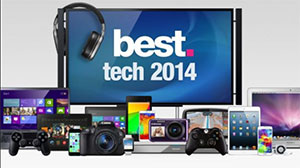Technology has taken some giant leaps forward last year – and also a few steps back. It’s been the year when wearable technology, driverless cars and drones all took the imagination.  But we’ve also seen a wave of security scares, hack attacks and all sorts of cyber-nastiness which have made us question just how positive a force the internet has been in our lives.
But we’ve also seen a wave of security scares, hack attacks and all sorts of cyber-nastiness which have made us question just how positive a force the internet has been in our lives.
January: A year of coding
This was the year when the idea that we need to change the way children engage with technology really took off. It seemed every month brought a new coding initiative – there were Code Clubs and Coder Dojos, years and hours of code…and more code.
February: How fast will TV change?
This year the long promised revolution in TV viewing gathered pace. We saw more evidence of a switch to online services like Netflix, and it seems that the digital generation is now far more inclined to watch YouTube than tune in to traditional TV. But figures show the average Guyana household still watches nearly three hours of good old fashioned broadcast TV a day. The big question – will Generation X grow up and learn to slump in front of the telly like Mum and Dad?
March: Facebook buys the Future
In March, Facebook bought the virtual reality headset pioneers Oculus Rift – to howls of anguish from some who felt that the social network was now a big bad corporation rather than an edgy upstart. Both Facebook and Microsoft have decided that if they are going to keep innovating, paying outlandish prices for smart young companies may be the way ahead.
April: Brain Mapping
A new map, a decade in the works, shows structures of the brain in far greater detail than ever before, providing neuroscientists with a guide to its immense  complexity.
complexity.
Neuroscientists have made remarkable progress in recent years toward understanding how the brain works. And in coming years, Europe’s Human Brain Project will attempt to create a computational simulation of the human brain, while the U.S. BRAIN Initiative will try to create a wide-ranging picture of brain activity. These ambitious projects will greatly benefit from a new resource: detailed and comprehensive maps of the brain’s structure and its different regions.
May: Google Glass – a fascinating failure
It was supposed to be the year wearable technology took off – but we end 2014 with the leading innovation in this field already looking a bit of a dud. Google Glass is very clever, but as I found when wearing it for a couple of months, it makes its users look daft. Technology firms are learning the hard way that new gadgets need to be fashionable as well as functional.
June: Silicon Valley – still disrupting the world
San Francisco-I found ample evidence at the crowd-funding site Indiegogo and the car service Uber that Silicon Valley is still producing ideas that disrupt the status quo. Uber – now valued at $40bn – has been the year’s most controversial and successful tech firm, attracting more hate than love as it barges its way through regulatory barriers.
July: Pocket Scan-one which changes the language.
The Pocket Scan balances on the fine line between ludicrous budget invention on a cable infomercial and utter practical brilliance. The simple, palm of the hand-sized, invention allows you to scan anything it comes into contact with. Pocket Scan’s added functionality that stands it apart. If, say, you were to scan a document, the Pocket Scan’s accompanying software will recognize the text – in any language – and turn the scanned file into a document that can be edited. The same goes for pictures and anything else you scan. All scanned images appear in real time on the computer or tablet as you can them, too.
August: Teenagers and the news game
Just as the digital generation has gone off boring old broadcast TV, teenagers don’t read newspapers or watch news bulletins. But never fear – they are getting news about events that interest them from all sorts of new sources, from games forums to social networks, from Buzz-feed to vice. The trick for old media organisations – and ageing journalists – is to find new ways of engaging these young people and to make them pay for news.
September: Smart Things
A company called Smart Things has also come up with a system that can automate almost all the electrical appliances of your home. The Smart Things system offers features like motion detection, time scheduling, and automatic locking. All the information is fed to your smartphone and notifications will appear on your phone to let you know if appliances are accidentally left on or if someone returns home.
October: Twitter and the poisoning of online debate
The web promised a new era of free expression, and social networks seemed at first to give everyone a voice in public debate. But those dreams are fading fast as the likes of Twitter and Facebook become noisy, sometimes hateful arenas for anyone with a cause to promote or an enemy to pursue. Some people described the networks as the “command and control systems” for terrorists, and those targeted by trolls demanded swifter action to deal with them. Meanwhile, finding any online forum where people could debate without resorting to insults and abuse got harder.
November: Nokia – still a mobile force?
It has been a year of turmoil in the world of mobile connectivity. Samsung has stumbled, caught out by the rise of Chinese newcomers like Xiaomi and the power of Apple’s brand. Blackberry brought out two new phones, the Passport and the Classic – but still looked likely to survive only as a niche player for the nostalgic keyboard lover. Microsoft completed its takeover of Nokia’s mobile business but still struggled to make much impact with Windows Phone. A surprise then when Nokia – the Finnish remnant that is – unveiled a new tablet. Can the company which had 40% of the mobile market stage an unlikely comeback? Or is the Nokia brand now just too confusing for consumers to bother with?
December: Hawking and the end of the human race
Never mind mobile phones and wearable gadgets, let’s end the year with the big picture – the future of the human race. Artificial Intelligence is going through a boom at the moment, with machines learning to do everything from drive cars to translate languages instantly. The cosmologist Stephen Hawking looked into the future, and speculated that computers which could evolve faster than humans would render us obsolete. Still, on the bright side, this is unlikely to happen in 2015. Happy New Year to all of you.



.jpg)








